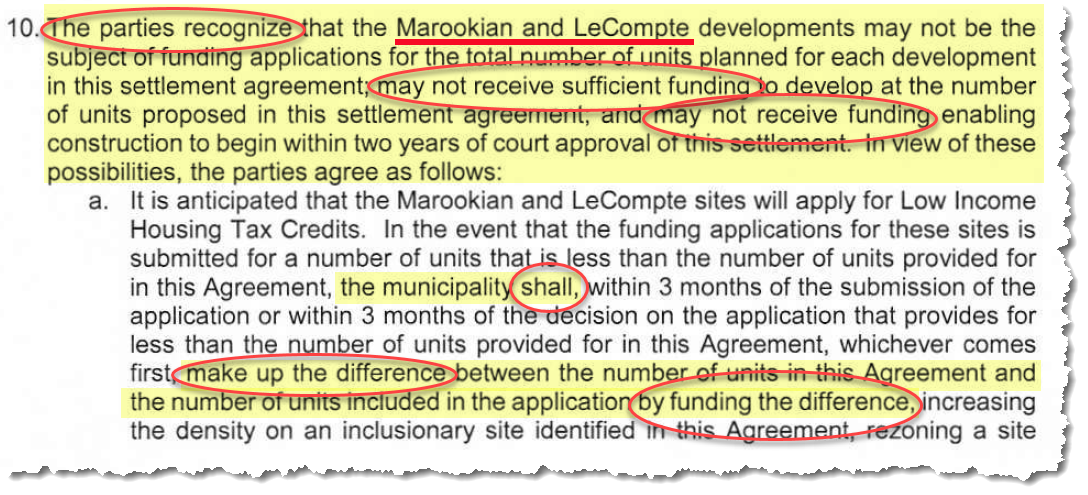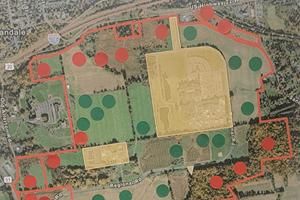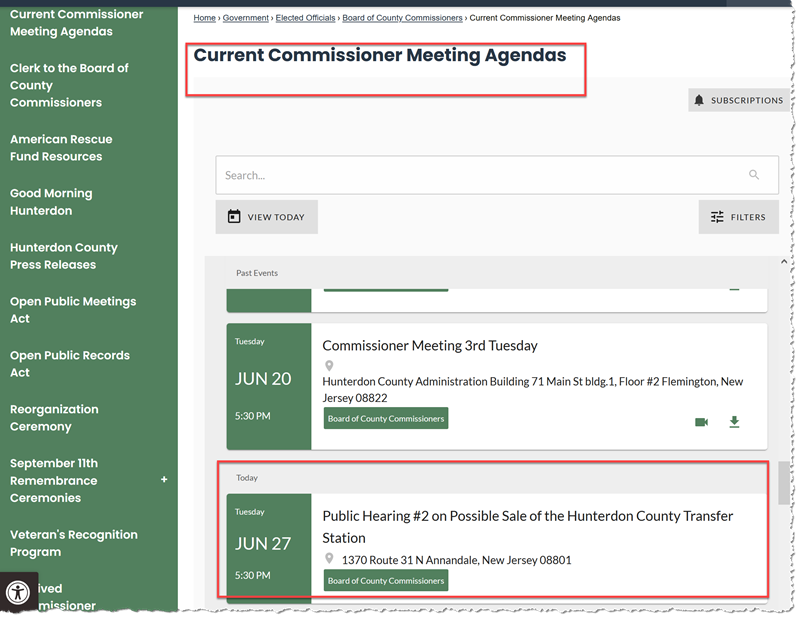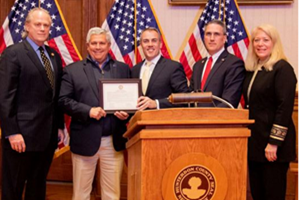 One of Clinton Township’s several new affordable housing developments was due to start construction any day, on Route 31 North across the highway from Spruce Run Reservoir. An “inclusionary” project, it would include affordable units among regular “market” units to ensure it would be profitable for the builder.
One of Clinton Township’s several new affordable housing developments was due to start construction any day, on Route 31 North across the highway from Spruce Run Reservoir. An “inclusionary” project, it would include affordable units among regular “market” units to ensure it would be profitable for the builder.
It would take what might be a forged signature to make it happen. But first, let’s discuss what you need to know about Clinton Township’s methods of managing affordable housing projects.
Affordable housing roulette
According to a court filing by the township, the affordable housing developer, Ingerman, recently “indicated its desire to change the 146-unit inclusionary development” after the original plan received approval from the Clinton Township Planning Board.
The township has modified its affordable housing plans over the past few years so many times that it looks like a game of land-use roulette.
New sites substituted for old sites. Numbers of units are altered. Developers are switched in and out. Work is duplicated and costs mount every time .
Every time changes are made, it seems the mayor and council try to hide the KA-CHING! sound that taxpayers might hear — by scheduling “special meetings” no one is likely to attend.
Never mind the scads of taxpayer dollars spent down the drain for the last affordable housing plan, the one before that, and the one before that. These plans require hours and hours of pricey time and work of lawyers, engineers, planners and other sundry “professionals” who love to make a good living.
No one has explained why Ingerman “desired” to eliminate all the profitable market units from the plan and to reduce the entire size of the project from 146 units to just 96. Sounds great, but what developer willingly shrinks an approved housing development because it’s good for the township?
What developer suddenly eliminates 66 highly profitable market units out of the goodness of its heart? Imagine the developer telling the township it has to rush a new ordinance so the developer can make less profit.
But that’s exactly what Ingerman did — and Mayor Brian Mullay and the council quickly scheduled a “special meeting” of the council at 1:00 p.m. June 27, 2023 to approve Ingerman’s changes by introducing an ordinance. The public will be allowed to comment on the ordinance at its second reading, when the council will also vote on approving it, on August 9.
But it’s not hard to imagine this mayor and council putting external interests ahead of their own constituents — and trying to keep it all quiet. They’ve scheduled quickie public meetings at odd hours before (e.g., May 6, 2021), whenever there’s an “affordable housing plan rush” to spend more taxpayer money on lawyers, planners and engineers.
While some of the township’s best, most senior employees say they have resigned citing poor office morale, poor management and uncompetitive salaries, the township’s budget for affordable housing work — legal, planning, engineers — seems as limitless as the council’s willingness to keep taxpayers in the dark.
Why a special meeting?
The day before the special meeting Township Administrator William Close explained in an e-mail that:
“Both the Township and the developer are under time constraints that require the revisions to be adopted by the end of August at the latest. The Council only meets once in August (August 9), so it is critical that the ordinance be introduced in time to hold the public hearing at the August 9 meeting.”
No explanation has been offered about why the revisions are being made — only that it’s critical and a rush.
Who’s driving the bus?
But this explanation has been thrown at the public again and again over the years. There’s always a rush that requires a special meeting at an odd time. An alternative explanation is obvious: Someone is not doing their job to properly manage what is probably the township’s #1 time and money suck: affordable housing plans.
Could this be because no one is driving this bus? William Close has been the township’s “contract administrator” — he’s not an employee; a consulting firm is renting him to the township — since June 2022, working part-time, three days a week, often from home, under a contract that council has renewed quarterly again and again.
If the mayor is the township’s CEO, then the administrator is the COO, responsible for day-to-day management and oversight of all departments and project. It seems affordable housing always winds up in crisis mode, and the township relies on “interim” temporary management that’s dropping stitches. (The township has had multiple interim administrators recently.) But who’s driving the bus?
The legal notice for the meeting
Such special meetings nonetheless require a legal notice, and the township issued one. It is the township Clerk that routinely prepares, signs and posts such notices.
The legal notice of the special July 27 meeting bares a conformed signature (also known as an electronic signature) of Carla Conner, the township Clerk:

However, Conner says she did not prepare the notice or sign it, digitally or otherwise. Nor, she says, did she authorize anyone else to sign her name. In fact, she says, she told the mayor she was never informed of the July 27 meeting and that in her opinion “the signature is a fraud.” She says she is very upset.
The question is, has Conner’s signature been inappropriately affixed to other township documents?
“We’ll take 8 hours a week”
Over two months ago, in early May, after 14 years’ employment with the township, Carla Conner resigned from her Clerk’s job for a better-paying position in Flemington Borough. She gave the township three weeks’ notice and offered to help transition a new hire into the job. Her last day was May 31. According to Conner, Clinton Township made no attempt to counter Flemington’s offer.
Nor, to her knowledge, was the township doing anything to fill the Clerk’s job. In New Jersey, the Clerk is a statutory position that requires a state license. That is, every town must have a Clerk to perform tasks not permitted to anyone else.
Conner started out as assistant to Clerk Donna Burham. Knowing Burham was going to retire in a few years, then-Administrator Marvin Joss and the Clerk formulated a succession plan — a career path for Conner. She received training from Burham, took classes and was fully prepared to take over as Clerk when Burham retired. Nothing of the kind was planned to replace Conner.
On June 12, Conner started her new job in Flemington. Meanwhile, the township had asked her as favor to work per diem eight hours per week for $35 an hour without benefits while it searched for a full-time clerk. Conner says she agreed, but only if she could do just limited tasks and only in the evenings. And only for a very short time. She would handle marriages, OPRA requests and sundry tasks, but she would not attend council meetings or handle meeting minutes. She says she expected to do this for just a few weeks. The council passed a resolution to make the hire on June 28.
Vacant jobs = $$avings
All towns advertise vacant Clerk jobs on the N.J. League of Municipalities’ job board. Clinton Township posted its vacant Clerk position on July 6, 2023 — almost two months after Conner gave notice. That’s over a month after her last day, and a week after it re-hired Conner per diem.
Hiring a new Clerk is the Administrator’s job, but it seems clear no one was really doing much, if anything, about it.
The township seems to have developed an interesting view of vacant jobs. When employees quit, “We’re saving money by not filling the job, or by hiring part-time contractors.” Or money is saved when a newly vacant job is “filled” by throwing a few thousand extra dollars at an existing employee to do work they don’t really have time (or skills or motivation) to perform adequately.
Is it any wonder employee morale has tanked? Where a department had two or three workers, some are down to one. There is no career path. Workloads become unbearable and the remaining employees work without management support.
It’s worth noting the Administrator of the past 12 months is a part-time, 3-days-a week contractor whose job was supposed to be temporary. Clinton Township, as one of the biggest, busiest towns in Hunterdon County, has always had a full-time Administrator, until the Higgins and Mullay administrations. Is it any wonder employee morale has bottomed out?
Is it “legit” or fraud?
When Conner complained to Mayor Mullay about using her signature without her knowledge or permission, he answered that he would consult township attorney Trishka Waterbury-Cecil. Conner says the mayor then conveyed the attorney’s response that because Conner’s name is preceded with /s/, “it’s legit.”
Adobe Systems is perhaps the leading purveyor of digitized documents, including electronic, or conformed, signature technology. On its website Adobe offers this advice to users (emphasis added):
What is an s-signature?
In the case of conformed signatures, which are another type of s-signature, the signer puts an “s” between two forward slash marks in front of their typed name (for example, /s/ Jimmy Doe). In fact, the s-signature name took its name from the conformed signature style.
Remember, the signature must be between forward slashes to make it valid. You must add an s-signature for yourself. Another party cannot add it.
We’re not lawyers
We’re not lawyers, so we consulted several respected legal websites, because the township’s behavior doesn’t add up.
Lawpath.com says this about signing someone else’s name (emphasis added):
When does this become illegal?
Under US law, falsifying a document is a crime. Forgery laws vary by state, but generally, signing a document as someone else without that person’s permission falls under this category as forgery. If the other person is unaware that you’re signing something for them and you’re gaining something, then you’re committing forgery. This is based on having the ‘intention to defraud’ someone. This applies even if you thought you had permission to sign something. It’s important to always have the permission of the person who you are signing on behalf of.
A word about ethics, integrity and common decency
When Carla Conner expressed dismay that her signature as a licensed New Jersey Clerk was used without her knowledge or permission, no one seemed to think it was a big deal. “It’s legit” was the last she heard, from the town attorney through the mayor.
Perhaps in some distant galaxy or legal world we mortals don’t understand, it’s all legal. Perhaps Conner’s sincere professional and personal concerns don’t deserve another thought.
But, perhaps the way those concerns were handled, along with uncompetitive pay, explains a lot about the low morale and employee attrition. Perhaps the loss of good employees and inept hiring and management practices explain quickie council meetings to address huge affordable housing projects that can cost taxpayers untold millions if they’re not managed skillfully and diligently.
Your chance to govern with questions
There is no transparency in government if people don’t ask questions.
If you don’t understand why Clinton Township is so easily letting a private developer drive changes to a massive “affordable housing” project, perhaps you’ll take the time to find out how your mayor and council and their administrator are running things.
You can show up on August 9, 7:00 p.m. at the regularly scheduled council meeting and ask why this project’s design is being changed — and why the township can’t keep its employees.
Public Safety Building
1370 Route 31 North – 3rd floor
Annandale, NJ 08801
Taxpayers can demand answers
You have a right to go to the microphone during the public hearing part of the meeting to ask:
- why the plan has really been changed
- how the changes might adversely affect the township
- how much money the changes might cost the township
- what the benefits might be to Ingerman, the developer
- what municipal funds may need to be expended to support the project
According to agreements the township has already signed, you could ask what costs taxpayers could be on the hook for:

- development costs Ingerman does not cover
- federal subsidies Ingerman cannot obtain
- a pedestrian crossing over Routh 31 North
- water and sewer capacity for the development
Because the township has already agreed to forego property taxes on these units for 30 years, you might want to ask for the truth about the PILOT deal they signed (Payments in Lieu of Taxes) which cuts the schools out of tax revenues they would normally get for new students from the new development. You can ask for a pro forma that reveals how much your school taxes could go up as a result of the PILOT deal.
And that’s just the public hearing about changes to the affordable housing plan.
HELP WANTED?
During the “regular” public comment period, you also have the right to ask the mayor and council:
- why they’re paying exorbitant sums for a temporary, part-time Administrator for over a year
- where their HELP WANTED signs are to replace the critical employees whose jobs they won’t fill
- why they’ve allowed employee morale to slip to a new low
- who is really running the township and driving critical decisions
It really is up to you
Or you could stay home and just complain your taxes keep going up, that you don’t get the municipal services you need, and that Clinton Township is going to hell in a handbasket. You could sit back and let the same people get re-elected automatically to those powerful council seats year after year after year because they run unopposed in every election.
You could also ask who signed former Clerk Carla Conner’s name to a legal notice without her knowledge or permission.
: :
 In the past two years Exxon has been told by large numbers of citizens that they oppose multiple proposals by the company to sell its property to warehouse developers, one of which was planning in excess of 4 million square feet of warehouse space.
In the past two years Exxon has been told by large numbers of citizens that they oppose multiple proposals by the company to sell its property to warehouse developers, one of which was planning in excess of 4 million square feet of warehouse space.

 In Hunterdon County’s Union Township a citizens’ group forced a warehouse developer to back off in the face of massive public opposition — for now.
In Hunterdon County’s Union Township a citizens’ group forced a warehouse developer to back off in the face of massive public opposition — for now. Mayor Brian Mullay either doesn’t know what ExxonMobil is going to “present” to the public at the big
Mayor Brian Mullay either doesn’t know what ExxonMobil is going to “present” to the public at the big  Exxon’s property is zoned for research, office and light manufacturing (ROM) and for various associated structures related to that. So Exxon can build something. Surely the mayor knows Exxon’s wishes — but he isn’t talking.
Exxon’s property is zoned for research, office and light manufacturing (ROM) and for various associated structures related to that. So Exxon can build something. Surely the mayor knows Exxon’s wishes — but he isn’t talking.  Even after two humiliating blunders in 2022, Clinton Township Mayor Brian Mullay still doesn’t get it. His job is not catering to powerful special interests like ExxonMobil or state agencies. It’s protecting his town and the interests of his citizens and taxpayers. All he has to do is use existing township land use regulations to do it. Yet the mayor continues to be seduced by the intoxicating attention of special interests and developers that are always drooling at the township’s door for political favors.
Even after two humiliating blunders in 2022, Clinton Township Mayor Brian Mullay still doesn’t get it. His job is not catering to powerful special interests like ExxonMobil or state agencies. It’s protecting his town and the interests of his citizens and taxpayers. All he has to do is use existing township land use regulations to do it. Yet the mayor continues to be seduced by the intoxicating attention of special interests and developers that are always drooling at the township’s door for political favors. “Let’s put on a show!”
“Let’s put on a show!” One of Clinton Township’s several new affordable housing developments was due to start construction any day, on Route 31 North across the highway from Spruce Run Reservoir. An “inclusionary” project, it would include affordable units among regular “market” units to ensure it would be profitable for the builder.
One of Clinton Township’s several new affordable housing developments was due to start construction any day, on Route 31 North across the highway from Spruce Run Reservoir. An “inclusionary” project, it would include affordable units among regular “market” units to ensure it would be profitable for the builder.

 What if the Hunterdon County Commissioners scheduled a public hearing but didn’t show up? What if Susan Soloway, Zach Rich, Shaun Van Doren and John Lanza were all M.I.A.? What if they sent just one commissioner and four stooges?
What if the Hunterdon County Commissioners scheduled a public hearing but didn’t show up? What if Susan Soloway, Zach Rich, Shaun Van Doren and John Lanza were all M.I.A.? What if they sent just one commissioner and four stooges?

 This “government in action” is known by an affectionate term here in New Jersey.
This “government in action” is known by an affectionate term here in New Jersey. Something doesn’t add up. The Hunterdon County Commissioners want to sell the county dump — the Solid Waste Transfer Station on Petticoat Lane near Route 22 in Clinton Township — which has operated for over 30 years. (See
Something doesn’t add up. The Hunterdon County Commissioners want to sell the county dump — the Solid Waste Transfer Station on Petticoat Lane near Route 22 in Clinton Township — which has operated for over 30 years. (See